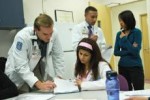Free clinic BRIDGEs the gap to better health

Chronic diseases like diabetes, hypertension and hyperlipidemia – high fat levels in one’s bloodstream – are the norm at Building Relationships and Initiatives Dedicated to Gaining Equality (BRIDGE) Healthcare Clinic. BRIDGE is a free clinic staffed by USF students, but every once in a while a case catches them off guard, like the man with swollen ankles.
Beyond the typical exam, the 23-year-old patient was given an MRI and had lab work done, but doctors at the clinic still couldn’t provide a diagnosis, BRIDGE co-director Omar Hammad said.
When cases such as this arise, the clinic turns to a specialist. This, BRIDGE co-director Waldo Guerrero said, can be one of the more difficult aspects of running the non-profit clinic.
Since none of BRIDGE’s patients have insurance and all are treated for free, volunteers have to convince the professional to see the patient pro bono.
Although free medical clinics exist in conjunction with many universities, BRIDGE’s quick startup set it apart from others in the industry. This early rise – the clinic opened within nine months instead of the 2-3 years it normally takes – has caused a few growing pains, as it searches for specialists to handle the University area’s diverse demands.
“For the women, we’re looking for gynecologists to do pap smears, and we’re really looking for cardiologists right now. We’re calling offices and trying to recruit them one by one,” Hammad said. “We’re essentially just a general clinic, and like with the guy with swollen ankles, he needed to see a rheumatologist - a doctor that specializes in joints – and getting those special doctors is challenging.”
The six-month-old clinic is used to bridging challenges, however.
BRIDGE Healthcare Clinic’s founders, Hammad, Guerrero, Samuel Crane and Shelby Kent, attended a conference on starting student-run clinics in 2006, and were told that such an endeavor takes at least two to three years to actualize, and sometimes up to five or six years, Hammad said.
“We worked as a team founding it, and without the four of us, I don’t think anybody could’ve done it,” he said. “Having a strong group of people behind it made it work.”
BRIDGE stemmed from a joint desire to provide aid to the underserved, impoverished area located just down the street from the University. Its patients’ incomes are at or below the poverty line, and all reside within the 33612 ZIP code.
Every Tuesday from 7 p.m. to 10 p.m., between four and eight patients visit the clinic, and each is treated by a complete wellness team consisting of a third- or fourth-year medical student, a first- or second-year medical student, a student social worker and an interpreter. If the patient suffers from muscular pain, he or she may see one of the two or three physical therapy students on duty, physical therapy patient coordinator Janelle Coffman said.
USF faculty members from the various departments represented at the clinic volunteer their time to advise the students.
“After students see the patients, they bring their notes to us to assess a plan for care,” said Ofelia Granadillo, who oversees students from the School of Social Work. “I help them write their progress notes, which helps them organize their observations.”
The Florida Department of Health allows BRIDGE to occupy part of the University Area Community Center on 22nd Street for free. To date, Quest Diagnostics has provided $8,000 worth of complimentary lab work. These things, combined with the $10,000 grant from the College of Medicine and other donations, have helped keep costs down for the fledgling clinic, Hammad said.
Since the clinic is not funded by USF, it has not been threatened by budget cuts, but BRIDGE has found itself in need of another form of aid from the University – student and faculty assistance. Aside from needing faculty specialists to diagnose atypical ailments, Hammad said that 50-60 percent of BRIDGE’s patients do not speak English.
“As long as we have student and faculty volunteers, we can survive,” Hammad said. “Students have been very enthusiastic about it so far, but we could use more interpreters. Most of our patients speak Spanish only, but we could also use interpreters fluent in Creole, and any language, really.”
Pre-med or medical students are preferred when it comes to selecting interpreters since they are familiar with medical terms, he said.
Once the clinic finds additional assistance and resources, BRIDGE would like to expand its services to meet the varied needs of the 33612 community.
“One of the things we’re looking to do is have gynecologists come in to provide a women’s health night once a month,” Guerrero said. “Similarly, once a month we want to have a psychiatry night, where a psychiatrist comes in and talks to people about their issues. One of the big things we’re working on right now is forming an electronic records system just like the one USF uses. A lot of private practices don’t even have that, and it’ll give our students a chance to experience working with electronic medical records.”
To find out about volunteering or learn more about BRIDGE’s services, check out bridgehealthcareclinic.org.





